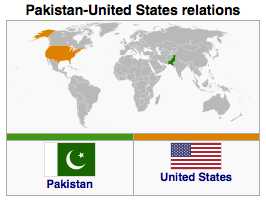US And Pakistan: Likely American Strategy In 2012 – Analysis
By IPCS
By Aryaman Bhatnagar
Relations between the US and Pakistan were frayed throughout 2011, however, it was the NATO strikes at the Salala check-posts in November that forced Pakistan to reassess its alliance with the US. Pakistan is expected to put forward new terms of engagement with the US later this month. Against this background, this commentary seeks to examine the likely American approach towards Pakistan in 2012. Would the US reconcile with Pakistan? What would be the nature of this reconciliation?
Pakistan is still viewed as a partner that Washington may not trust but cannot afford to lose, especially because of its objectives in Afghanistan. Improved relations with Pakistan are essential for ending the blockade imposed by Pakistan on the NATO supply trucks since December 2011. Moreover, Washington’s battlefield strategy to break the momentum of the Taliban in order to improve its negotiating position at the table cannot be realized without Pakistan’s assistance (The Washington Post, 2 January 2012).
What is the likely American approach towards Pakistan in 2012?

In 2012, Washington will definitely reconcile with Pakistan. Ever since the November NATO strikes, Obama’s administration has attempted to mend fences with Pakistan. The US State Department spokesperson, Victoria Nuland, said “We want to get back to normal and get into full counterterrorism relationship again.” (The Express Tribune, 4 January 2012). However, Pakistan insists on changing the equation between the two countries and urges for relations based on mutual respect, with clearly drawn lines. It is clear that in order to ensure that relations with Pakistan normalize Washington would have to accept certain demands put forth by Islamabad.
This may include a reduction in the number of US military personnel in Pakistan, additional tolls or taxes on NATO supply trucks and possible charges for the use of Pakistani airspace, reassurance to Islamabad that unilateral Abbottabad-style raids would not occur in the future, and also accept responsibility for the NATO strikes.
Will the US now toe Pakistan’s line?
While the above measures may be important to ensure that the strategic alliance with Pakistan endures, it is unlikely that Washington would toe Islamabad’s line. There would be ample space even in the new US-Pakistan equation for Washington to maintain the pressure on Islamabad to safeguard its own interests. For instance, while the NATO supply routes through Pakistan are important, they account only for one-third of the cargo that enters Afghanistan, and NATO has repeatedly claimed that it has sufficient alternate routes to supply its forces. The efforts to build up the Northern Distribution Network, the supply route that passes through Russia and Central Asia, have made considerable progress. Moreover, increased taxes on the Pakistani supply routes would decrease their attraction as cheaper options for NATO. In light of this, the threat of closing such routes again in the future can hardly be a deterrent for the US, in case it decides to increase pressure on Pakistan.
The US continues to remain one of the major financial backers of Pakistan and its military, a role that even China is neither capable nor willing to fulfil. As a result, the tactic of withholding aid to Pakistan will be a definite leverage for Washington to maintain pressure. Already, Obama has signed the national defence authorization bill, which seeks to suspend 60 per cent of the US$ 1.1 billion military aid to Pakistan. Any unconditional US aid in the future is unlikely and there are growing demands in the US to penalize Pakistan by reducing the aid further unless it steps up its campaign against the militants on its soil. The reduction in aid has undoubtedly had an adverse affect on Pakistan’s crumbling economy. Moreover, there is increasing fear in Pakistan that antagonizing Washington could lead the latter to use its influence with international financial institutions like the IMF and World Bank to hurt the country’s economic interests.
Finally, as the defeat of al Qaeda and its affiliates continues to remain a high priority for the US, Islamabad’s efforts to curb the activities and presence of such militants in the region would be closely monitored by Washington. This suggests that in addition to suspending aid to Pakistan, the drone programme – considered by many American officials as the most effective way of fighting militancy in Pakistan – is going to remain a vital strategy option. Reports are already suggesting that NATO may resume its drone programme, especially with the looming threat of the newly formed Taliban shura, which has vowed to attack American troops in Afghanistan and was allowed to be formed due to the temporary halt in drone strikes following the Salala incident.
Given that this is the US presidential election year, both the Democrats and the Republicans would be keen to demonstrate that they are willing to take such stern steps against Pakistan. Despite any pacification of Pakistan, the US is unlikely to reduce its pressure or demands on Islamabad to ‘do more’.
Aryaman Bhatnagar
Research Intern, IPCS
email: [email protected]

I think the writer does not know the political situation in Pakistan has completely changed and Imran Khan is going to be a major player in the future set up of the Government. He is totally anti-American so USA and Pakistan are in for a divorce.
USA and NATO is going to be the biggest loser in this context of which is no mention in this biased article.